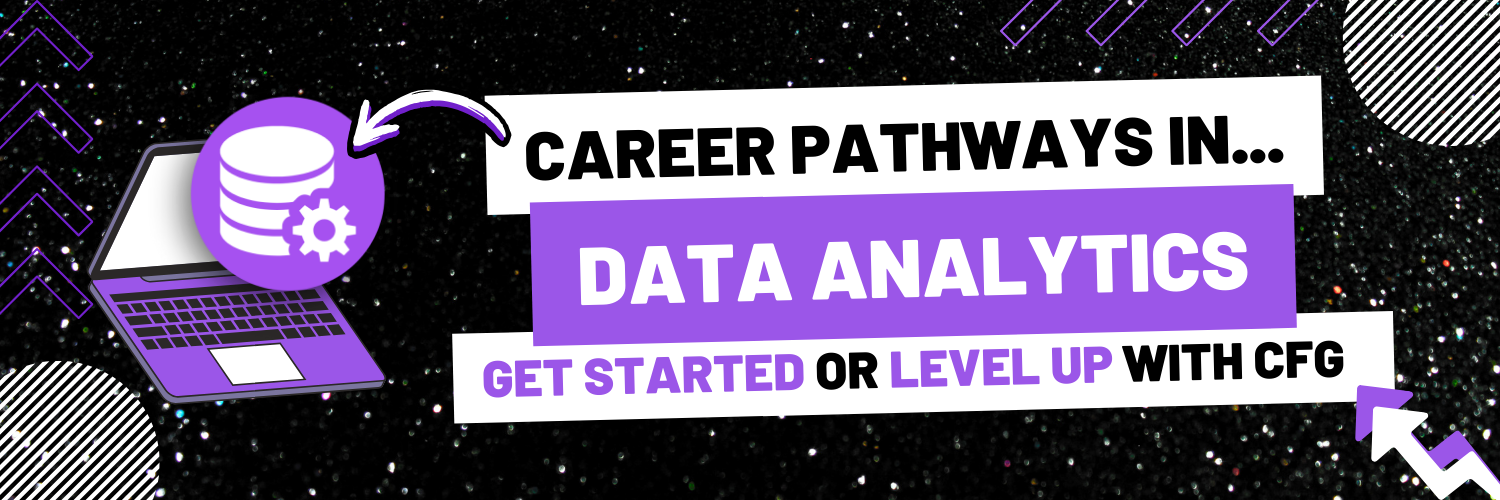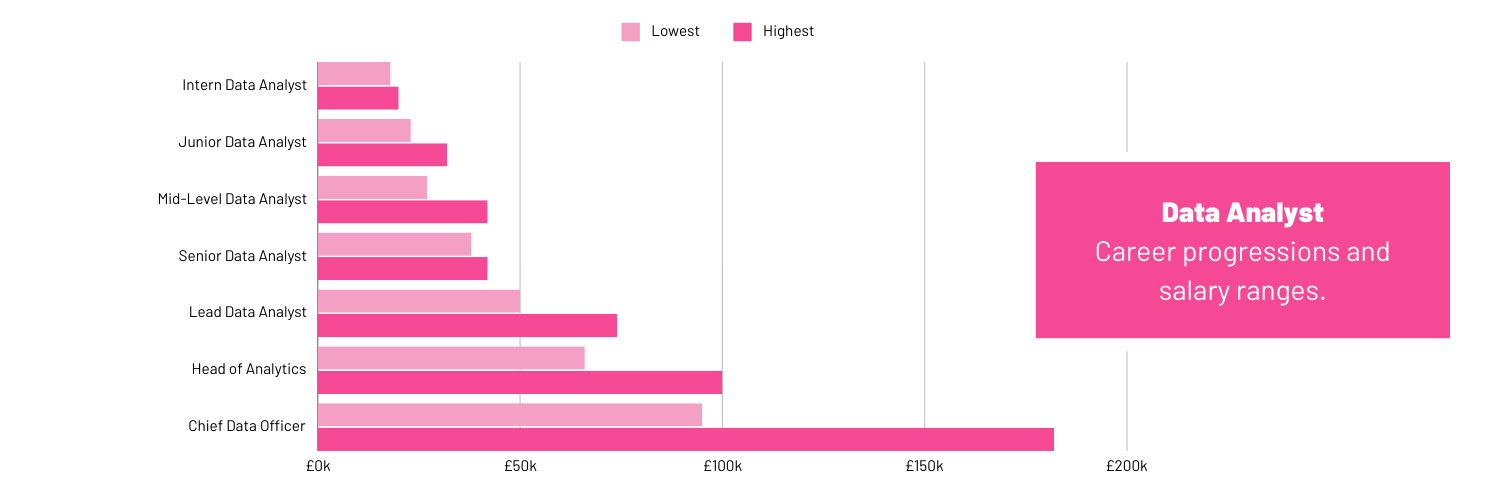
Content Menu
How to start & progress a career in Data Analysis
WHAT IS A DATA ANALYST?
Data Analysts play a key role in almost every business within tech and other industries. They are responsible for examining and interpreting data to provide actionable insights for their wider teams and stakeholders- this can serve as a foundation for making informed decisions and strategic planning to support the growth and development of the business.
The world of data can be fun and exciting, especially for those who enjoy investigating the finer details and problem-solving. A Data Analyst’s day-to-day tasks involve (as you may have already guessed) a lot of data! From collecting, to cleaning and then analysing data to pinpoint any correlations or trends. They are data storytellers, by using statistical methods and visualisation tools, their data can then be turned into reports and dashboards to help other people (technical and non-technical) understand the wider information it brings.
JOB ROLES IN DATA ANALYTICS
Job roles and tasks can vary depending on the industry, but here’s a quick overview of the types of job roles in data analytics:
Data Analyst:
Focuses mainly on collecting, cleaning, and analysing data to provide actionable insights.
Business Analyst:
Analyses business processes and requirements, using data to identify opportunities for improvement and inform business decision-making i.e. budgets.
Operations Analyst:
Focuses on optimising operational efficiency using data-driven insights.
Market Research Analyst:
Gathers and analyses market data to assist in strategic business decisions and positioning, i.e. new market or product opportunities.
Financial Analyst:
Analyses financial data to support budgeting, forecasting, and financial decision-making often working in investment banking, insurance firms, private equity, etc.
Data Engineer:
Focuses on designing and maintaining the architecture for collecting, storing, and processing large volumes of data. They are key players in ensuring data is accessible and usable by the wider business to meet goals.
Data Architect:
Concerned with designing the overall structure and organisation of data – as well as deploying and managing systems to ensure scalability and efficiency.
DATA ANALYST CAREER PROGRESSION & SALARIES
Data analysis presents many roles and specialisations to get into as a career. You can acquire more specialised skills and take on more complex and strategic responsibilities as you go up. To succeed in this role, you must be keen and open-minded about continuous learning within the ever-evolving space that is technology. But this also means you have many opportunities to progress onwards in the world of data, no matter what industry.
ENTRY-LEVEL TO JUNIOR TO MID-LEVEL ROLES
Entry-Level / Junior Data Analyst
Responsibilities may include: Assist in collecting and cleaning data, which also means fixing or correcting incorrect data from the data set. Perform basic data analysis using statistical techniques, then create simple reports and dashboards to present to the team.
Data Analyst Mid-Level
Responsibilities may include: Collaborating with teams such as marketing, to understand the business needs by presenting a more in-depth analysis of data. At the same time, developing and maintaining automated data processes.
SKILLS CHECKLIST FOR A DATA ANALYST
✔️Ability and confidence to communicate data insights effectively to different teams
✔️Strong attention to detail
✔️Basic to advanced knowledge of Excel and statistical analysis
✔️Proficiency in SQL & Data visualisation tools
✔️Understanding basic programming languages such as R or Python
SENIOR LEVEL ROLES
Senior Data Analyst
Responsibilities may include: Leading more complex data analysis projects and collaborating with stakeholders in the company, i.e.Product Managers, to help with data-driven decision-making, such as product development and launches.
Lead Data Analyst / Analytics Manager
Responsibilities may include: Manage a team of data analysts and collaborate with other departments to align analytics and data findings with the business goals. This includes overseeing different projects and strategies.
SKILLS CHECKLIST
✔️Predictive modelling skills
✔️Understanding business acumen and being able to translate data insights into actionable recommendations
✔️Project management
✔️Leadership and team management
✔️Industry-specific analytics
LEADERSHIP ROLES
Director of Analytics / Head of Analytics
Responsibilities may include: Manage overall budgets and resources for departments, as well as overseeing strategies and analytics to make data-driven decisions across the whole organisation.
Chief Data Officer (CDO)
Responsibilities may include: The CDO may oversee all aspects of data strategy, which involves aligning data initiatives with the overall business strategy, delivering innovation strategies, and ensuring data governance.
SKILLS CHECKLIST
✔️Strong executive leadership skills & understanding of business operations
✔️Ability to communicate complex insights to different teams and stakeholders both technical/non-technical
✔️Deep understanding of data compliance and data governance
DATA ANALYST SALARIES
Entry-Level Positions
- Intern Data Analyst:
- Unpaid short-term contract
- Depending on company, location and nature of work. Placement students in the UK may earn around £18k – £20k for the year
- Junior Data Analyst: £23k – £32k /yr
- Mid-Level Data Analyst: £27k – £42k /yr
Senior Level
- Senior Data Analyst: £38k – £42k /yr
- Lead Data Analyst: £50k – £74k /yr
Management Positions
- Head of Analytics: £66k – £100k /yr
- Chief Data Officer: £95k – £182k /yr
HOW TO BECOME A DATA ANALYST WITH CODE FIRST GIRLS
As you progress, it’s important to stay curious about technology trends and develop an appetite for continuous learning to gain new practical experiences and career progression.
We offer a wide range of ‘Intro To…’ courses to get you started in your Data Analytics pathway. Whether you’re new to learning or looking for a refresh, this self-paced, bitsized course is a great place to start learning the ins and outs of Data, as well as Python and gaining an introduction to coding.
Managing and analysing data is a core skill many employers look out for, especially in tech where data is produced daily! Our classes will take you through database management, data visualisation and more!
After developing your data knowledge skills with our Tech Tasters and Classes, you’ll be able to expand this further with our Data CFGdegree course, which will prepare you for a career as a Data Analyst, Data Scientist, Data Engineer, Data Architect, and more.
Our +Masters for Data will focus on developing those skills further to be able to explore roles such as Business Analyst and Quantitative Analyst and garnering the core skills in data collection with Excel and data visualisation using Python, Project Maintenance and more.
For those with 2+ Years of experience, our Mid-Level Accelerator course is designed to help you level up and unlock your developer velocity.
HEAR ABOUT ADARA’S CFGDEGREE EXPERIENCE
Here’s a quick Q&A with Code First Girl’s CFGdegree Graduate, Adara, who completed the Data Pathway in the Autumn of 2022.
What are the top 3 things you do weekly?
- One of my more consistent tasks is to create dashboards from our data for the wider team. This means that the data is accessible and can then be used to generate business insights and actions based on what it tells us. As I am dealing with marketing data specifically, this could be anything from an Ads Dashboard to a Survey Response dashboard, to client/partner insights.
- I also create a lot of surveys to generate community insights that we can use on socials or for our research reports.
- The third most consistent task I have is analysing our data to pull insights for the team.
But the role is so varied, so these 3 can rotate and of course I have admin bits to do too like writing documentation, planning for future insights and cleaning data!
What about Data do you find most interesting?
I would say I’m a pretty curious person, so diving into data and pulling out interesting statistics and facts is my favourite part of the job. It’s amazing to be able to translate a huge dump of information into insights that we as a business can use to further our cause.
Does it ever get overwhelming managing the data?
Initially yes, when I first started. Now I have been trained in using tools that help manage this and have an amazing manager who is always on hand to support me if I have questions. Our data is held in a data warehouse where I can use SQL to ask questions and pull out specifics, so I am not dealing with huge spreadsheets all day!
How would you describe the experience of working with data
It feels a bit like fishing sometimes. I’m sifting through these big lakes of information, looking for something that we can use. Uncovering impactful insights for our research reports or pulling out useful insights for the team is very rewarding.
What program do you use most often and why?
I use Snowflake the most. It is our data warehouse, so I need it to interact with our data to do my job. I love it because it’s super easy to use and I can save queries if I need to access the data again!
INDUSTRIES FOR DATA ANALYTICS

The Music Industry
Data Analysts working in tech within the music industry would have a variety of tasks related to using data to analyse audience behaviours such as listening habits, engagements, etc. They may also use predictive modelling techniques to forecast trends or user behaviours and develop music recommendations for listeners. They may also collaborate with other teams such as Product Managers, Designers and Engineers by providing data-driven insights to help with business decision-making and product development.

Space Industry
The Space industry has plenty of great opportunities for Data Analysts. One of those routes includes Satellite Data Analysis which involves collecting data captured by satellites such as sensory data, telemetry data and imagery. They can use these data types to gain more information about the surface and environments of the Earth in real time, as well as what’s going on in outer space. Data Analysts in this field will manage mass volumes of data daily, produced from different space-related activities so a deep passion for space and data is a must!
CONCLUSION
Learning to understand and use data can be a great skill to have across many job roles, both technical and non-technical, and in many industries. If you’re new to data analytics or want to learn more about it, then head over to our courses page to discover the right course for you.

